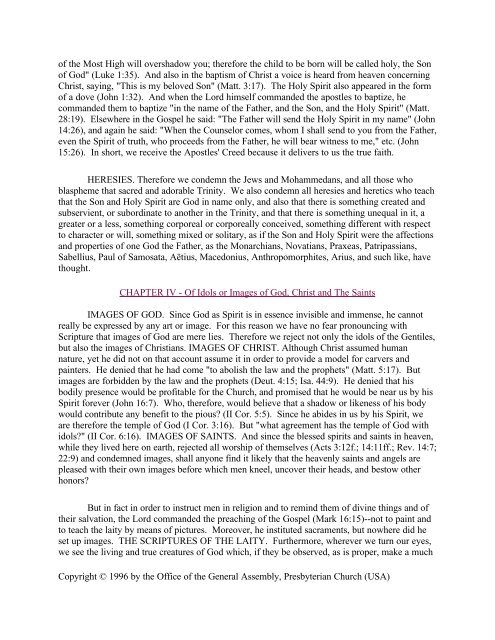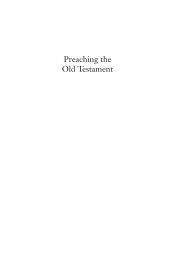The Book of Confessions - The Presbyterian Leader
The Book of Confessions - The Presbyterian Leader
The Book of Confessions - The Presbyterian Leader
Create successful ePaper yourself
Turn your PDF publications into a flip-book with our unique Google optimized e-Paper software.
<strong>of</strong> the Most High will overshadow you; therefore the child to be born will be called holy, the Son<br />
<strong>of</strong> God" (Luke 1:35). And also in the baptism <strong>of</strong> Christ a voice is heard from heaven concerning<br />
Christ, saying, "This is my beloved Son" (Matt. 3:17). <strong>The</strong> Holy Spirit also appeared in the form<br />
<strong>of</strong> a dove (John 1:32). And when the Lord himself commanded the apostles to baptize, he<br />
commanded them to baptize "in the name <strong>of</strong> the Father, and the Son, and the Holy Spirit" (Matt.<br />
28:19). Elsewhere in the Gospel he said: "<strong>The</strong> Father will send the Holy Spirit in my name" (John<br />
14:26), and again he said: "When the Counselor comes, whom I shall send to you from the Father,<br />
even the Spirit <strong>of</strong> truth, who proceeds from the Father, he will bear witness to me," etc. (John<br />
15:26). In short, we receive the Apostles' Creed because it delivers to us the true faith.<br />
HERESIES. <strong>The</strong>refore we condemn the Jews and Mohammedans, and all those who<br />
blaspheme that sacred and adorable Trinity. We also condemn all heresies and heretics who teach<br />
that the Son and Holy Spirit are God in name only, and also that there is something created and<br />
subservient, or subordinate to another in the Trinity, and that there is something unequal in it, a<br />
greater or a less, something corporeal or corporeally conceived, something different with respect<br />
to character or will, something mixed or solitary, as if the Son and Holy Spirit were the affections<br />
and properties <strong>of</strong> one God the Father, as the Monarchians, Novatians, Praxeas, Patripassians,<br />
Sabellius, Paul <strong>of</strong> Samosata, Aëtius, Macedonius, Anthropomorphites, Arius, and such like, have<br />
thought.<br />
CHAPTER IV - Of Idols or Images <strong>of</strong> God, Christ and <strong>The</strong> Saints<br />
IMAGES OF GOD. Since God as Spirit is in essence invisible and immense, he cannot<br />
really be expressed by any art or image. For this reason we have no fear pronouncing with<br />
Scripture that images <strong>of</strong> God are mere lies. <strong>The</strong>refore we reject not only the idols <strong>of</strong> the Gentiles,<br />
but also the images <strong>of</strong> Christians. IMAGES OF CHRIST. Although Christ assumed human<br />
nature, yet he did not on that account assume it in order to provide a model for carvers and<br />
painters. He denied that he had come "to abolish the law and the prophets" (Matt. 5:17). But<br />
images are forbidden by the law and the prophets (Deut. 4:15; Isa. 44:9). He denied that his<br />
bodily presence would be pr<strong>of</strong>itable for the Church, and promised that he would be near us by his<br />
Spirit forever (John 16:7). Who, therefore, would believe that a shadow or likeness <strong>of</strong> his body<br />
would contribute any benefit to the pious? (II Cor. 5:5). Since he abides in us by his Spirit, we<br />
are therefore the temple <strong>of</strong> God (I Cor. 3:16). But "what agreement has the temple <strong>of</strong> God with<br />
idols?" (II Cor. 6:16). IMAGES OF SAINTS. And since the blessed spirits and saints in heaven,<br />
while they lived here on earth, rejected all worship <strong>of</strong> themselves (Acts 3:12f.; 14:11ff.; Rev. 14:7;<br />
22:9) and condemned images, shall anyone find it likely that the heavenly saints and angels are<br />
pleased with their own images before which men kneel, uncover their heads, and bestow other<br />
honors?<br />
But in fact in order to instruct men in religion and to remind them <strong>of</strong> divine things and <strong>of</strong><br />
their salvation, the Lord commanded the preaching <strong>of</strong> the Gospel (Mark 16:15)--not to paint and<br />
to teach the laity by means <strong>of</strong> pictures. Moreover, he instituted sacraments, but nowhere did he<br />
set up images. THE SCRIPTURES OF THE LAITY. Furthermore, wherever we turn our eyes,<br />
we see the living and true creatures <strong>of</strong> God which, if they be observed, as is proper, make a much<br />
Copyright © 1996 by the Office <strong>of</strong> the General Assembly, <strong>Presbyterian</strong> Church (USA)




